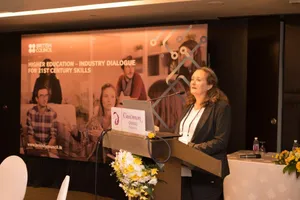IER News & blogs
Upcoming seminar: Academic mobility and employability
 Employability gain is often connected to international experiences, however, empirical findings are sparse. The Academic Mobilities and Immobilities Network (AMIN) and IER are organising a research seminar to explore research on academic mobility on 23 May. There will be presentations from Dr Toni Wright (Newham College), Eluned Jones (University of Birmingham) and Gaby Atfield (IER) focusing on: do students enrolled in UK Higher Education Institutions gain international experiences by studying or working in a different country, or by taking part in international events on the UK campus?; and do international students enhance their employability by studying in a UK higher education institution? To register and find out more here.
Employability gain is often connected to international experiences, however, empirical findings are sparse. The Academic Mobilities and Immobilities Network (AMIN) and IER are organising a research seminar to explore research on academic mobility on 23 May. There will be presentations from Dr Toni Wright (Newham College), Eluned Jones (University of Birmingham) and Gaby Atfield (IER) focusing on: do students enrolled in UK Higher Education Institutions gain international experiences by studying or working in a different country, or by taking part in international events on the UK campus?; and do international students enhance their employability by studying in a UK higher education institution? To register and find out more here.
Credentials and self-reported skill gain do not measure the same
 As a part of the LEGACY project, Dr Heike Behle recently presented a paper in which two ways to measure learning gain were critically assessed: Credentials and self-assessed improvement of specific skills.
As a part of the LEGACY project, Dr Heike Behle recently presented a paper in which two ways to measure learning gain were critically assessed: Credentials and self-assessed improvement of specific skills.
Both ways have drawbacks: Credentials can be an effective way of measuring student learning within a particular class, since most institutions have a scaled grading system already in place. It is problematic, however, to use across classes and institutions and it does not measure the ‘distance travelled’ during higher education. On the other hand, self-assessed improvement of skills will always be subjective and will differ according to individuals’ personality and their personal and HE-related circumstances such as gender and subject studied. It is also important to notice that both data is censored, i.e. improvement is not unlimited.
Using Futuretrack data, Heike compared both ways and found that those who increased their learning gain using credentials are less likely to assess their skills highly, both variable correlate negatively. The findings are currently being prepared for publication. Reported in THES.
The role of higher education to produce employable graduates
 Dr Heike Behle on invitation of the British Council at the Higher Education - Industry Dialogue in Sri Lanka gave a presentation on the role of higher education to produce employable graduates. Heike also demonstrated different ways to measure the employability of graduates based on her work for the LEGACY project.
Dr Heike Behle on invitation of the British Council at the Higher Education - Industry Dialogue in Sri Lanka gave a presentation on the role of higher education to produce employable graduates. Heike also demonstrated different ways to measure the employability of graduates based on her work for the LEGACY project.
New report - Graduates in non-graduate occupations
A recent IER report prepared for HEFCE and SRHE IER's Dr Heike Behle compares the early pathways of graduates from two leaving cohorts: those who graduated in 1999 (‘class of 1999’) and those who graduated from three year courses in 2009 and from four year courses in 2010 ('class of 2009/2010'). It shows that the proportion of employed graduates working in non-graduate jobs during their first year after graduation has remained high with approximately 36 per cent of all employed graduates from three year courses and, respectively 30 per cent of all employed graduates from four year courses working in non-graduate jobs fifteen months after graduation.
Behle, H. (2016) Graduates in non-graduate occupations (Report prepared for HEFCE and SRHE). London: Higher Education Funding Council for England.
Student and graduate focus group participants needed
The Higher Education Statistics Agency (HESA) has commissioned a piece of research by the Institute for Employment Research (IER) at the University of Warwick. HESA is leading a review to find out what future requirements there will be for data on the destinations and outcomes for students leaving HE. To help inform the Review, HESA wants to find out particular information from students and graduates and we would like to invite students and gradautes to participate in an online or face-to-face focus group.
The first face-to-face focus group will be held at the University of Warwick on 14 June at 3pm. All participants will receive £10 for their participation. Click here to find out more or sign up for this focus group or future online groups.
